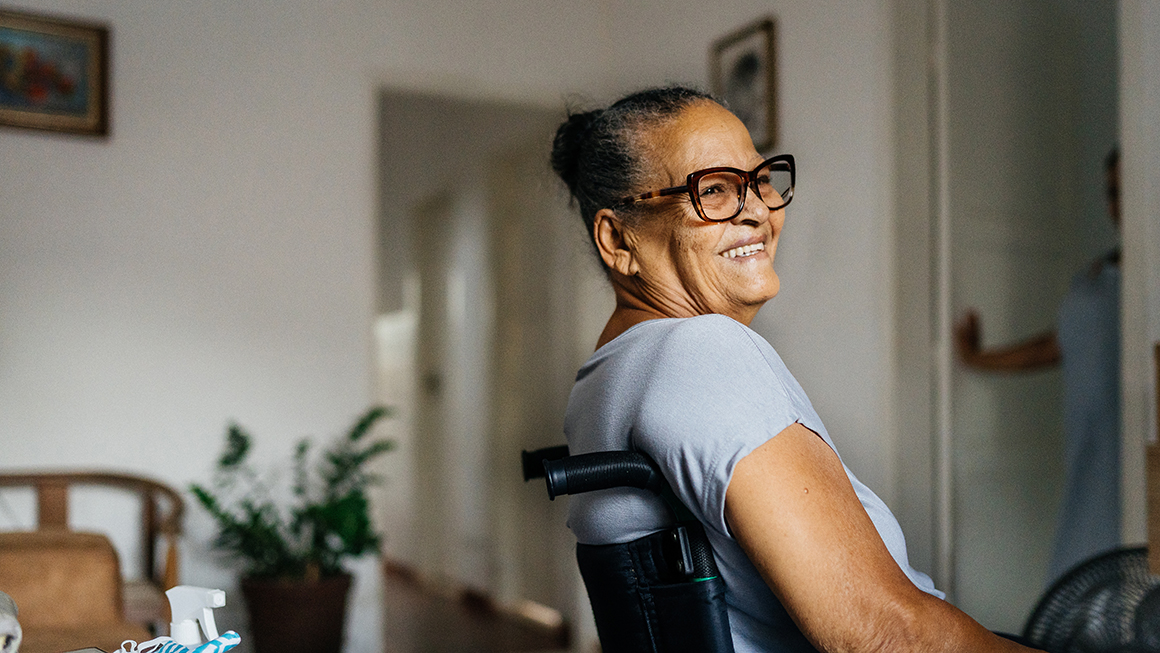
People with disabilities face the consequences of both structural racism and ableism in the housing market. That’s why one of the key principles of the Urban Institute’s Housing Justice Hub is accessibility and anti-ableism, meaning that housing needs to be available for everyone, especially those who have experienced discrimination in the housing market.
Because of ableism, disabled people face multiple barriers to housing, including the lack of affordable and accessible housing and landlord discrimination. The intersectional nature of disability also means that disabled people of color—especially Black, Indigenous, and Latinx people—are disproportionately likely to have low incomes and face greater challenges finding housing they can afford.
Dismantling ableism and achieving disability justice would also require housing justice, which Urban’s Housing Justice Hub defines as: “Ensuring everyone has affordable housing that promotes health, well-being, and upward mobility by confronting historical and ongoing harms and disparities caused by structural racism and other systems of oppression.” Advancing both housing justice and disability justice is crucial to ensuring everyone has access to the safe, accessible, and affordable housing they need.
People with disabilities face significant barriers to housing access
Our recent research (which elevated the voices of people with lived experience by partnering with a disability-led organization and incorporating guidance from a community advisory board) highlights the unique barriers people with disabilities face in the housing market.
Through an analysis of 2021 Current Population Survey data, we found 18 million disabled people in the United States are eligible for federal housing assistance but aren’t receiving it. Most people with disabilities are heads of their household and are twice as likely to live alone than nondisabled people. Further, 7 million disabled people live with an adult head of household who is a relative (half of whom are 55 or older), suggesting many are living with aging caregivers.
In addition to the lack of affordable housing overall, disabled people face an acute shortage of housing that is accessible or includes the services they need. The federally assisted housing stock that serves households with the lowest incomes is old; much of it was built before the 1970s and is therefore exempt from the requirements of the Americans with Disabilities Act. This housing increasingly serves older adults and people with disabilities, many of whom live in units that don’t meet their needs.
Some housing authorities have formed partnerships or leveraged other funding sources to provide innovative services, but most still offer only basic service connection. There is also an acute shortage of accessible housing in the private market, leaving many older adults and people with disabilities at risk of having to move to institutional settings, like nursing homes.
Strategies to advance disability justice and housing justice
Achieving disability justice and housing justice would require addressing the factors that have led to more than 18 million people with disabilities facing significant barriers to finding stable and quality housing that is affordable, accessible, and inclusive of their needs. The following strategies can advance progress toward both housing justice and disability justice:
- Improve data collection tools to understand the scale of the problem
Most federal datasets related to housing access omit people experiencing homelessness, disabled people living in institutions, and disabled people living in carceral institutions—resulting in a significant underestimate of people with disabilities. Improving federal data collection tools to include these groups would create a more accurate picture of the number of people currently excluded from the housing market.
- Coordinate federal, state, and local policies to expand housing access for people with disabilities
Meeting the housing needs for people with disabilities will require an unprecedented and coordinated effort at all levels of government to implement policies that increase housing assistance and availability in resource-rich areas, prioritize making housing affordable for disabled people with extremely low incomes, and ensure that more housing is designed to be accessible and inclusive. It will also require increasing the supply of federal tenant- and project-based vouchers, development subsidies, and incentives targeted toward housing for people with disabilities, as well as exploring models like social housing to support the development of more affordable housing.
- Invest in innovative models for community-based housing that allow disabled people to thrive
Some examples across the US show how to implement these models. Our research partners at The Kelsey have codeveloped two mixed-income, mixed-ability communities that offer housing that’s affordable for very low-income residents, accessible for people with a range of disabilities, and has an inclusive culture. Main Street Connect is a membership-based community that provides inclusive, affordable housing and community engagement for people with and without disabilities. And some public housing agencies have developed partnerships to offer affordable assisted living and wraparound services that enable older and disabled residents to remain in the community rather than being forced into nursing homes when their needs increase. These kinds of innovations support disabled people in being active members of their community.
By recognizing the interconnected nature of housing justice and disability justice, policymakers and practitioners can advance solutions that ensure everyone has access to the housing they need to thrive.
Let’s build a future where everyone, everywhere has the opportunity and power to thrive
Urban is more determined than ever to partner with changemakers to unlock opportunities that give people across the country a fair shot at reaching their fullest potential. Invest in Urban to power this type of work.